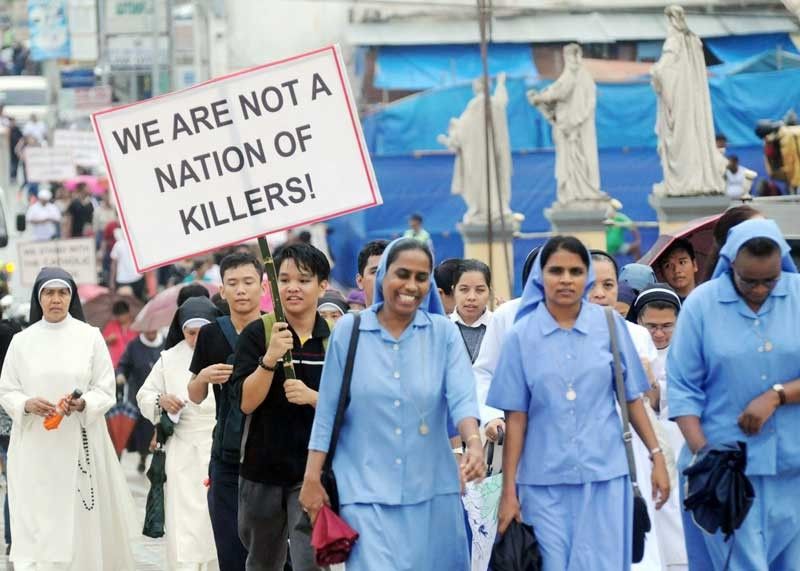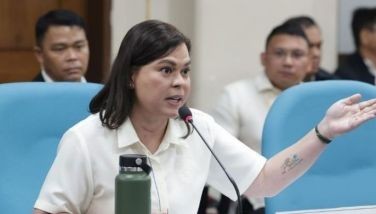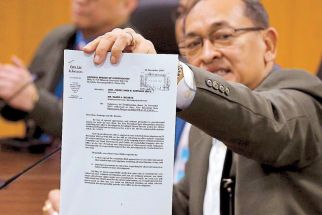Yearender: Church still favorite whipping boy

MANILA, Philippines — By being vocal against key policy initiatives of the administration including the vicious war on drugs, the Catholic Church has become a favorite whipping boy of President Duterte.
Days after he won in the 2016 polls, Duterte made known his disdain for the Roman Catholic Church, the faith more than 80 percent of Filipinos claim to embrace.
Ticked off by bishops who opposed his campaign platforms like the restoration of death penalty, Duterte vowed to defy the stand of the Church, which he described as “the most hypocritical institution.”
He also claimed that the government’s effort to limit population growth was “not moving” because previous presidents deferred to the opinion of the Church.
But the thorniest aspect in the relationship between Duterte and the Church is the government’s war on illegal drugs, which has so far left more than 5,000 drug suspects dead, based on official estimates.
The Church has condemned the supposed extrajudicial killings tied to the anti-drug crackdown and has called for respect for the sanctity of life. To raise awareness about the issue, some parishes displayed photos of slain drug suspects and posted tarpaulins containing the words “Thou shall not kill.”
One church had even placed a “Stop the killings” signage on top of a crucifix.
Duterte responded by echoing the police line that the slain drug suspects had chosen to resist arresting officers. He also claimed that the Church has no right to moralize because of the sexual abuses involving priests, the “shameless” bishops who sought favors from government officials and the alleged opulent lifestyle of some members of the clergy.
The rift between Duterte and the Church persisted in 2018, with the President going as far as questioning God’s reason for allowing temptation to tarnish his creation.
In a speech delivered in Davao City last June, Duterte said God must have been stupid for creating something perfect and then allowing something to tempt and destroy the quality of His work.
The remark sparked outrage among Catholics and other Christians who thought that the President had crossed the line when he attacked the Supreme Being Himself.
Critics had also chided Duterte for using his speeches to rant about God and religion instead of discussing the country’s pressing issues.
Right to speak
But Duterte’s spokespersons argued he could not be deprived of his right to express views on matters of religion because such right is guaranteed by the Constitution.
His spokesman and chief legal adviser Salvador Panelo had said Duterte “was just posing an honest question as regards the logic or rationale behind the theory of creation.”
While Panelo justified Duterte’s statement, the President’s daughter, Davao City Mayor Sara Duterte-Carpio, urged the public not to listen to her father when he interprets the Bible because he is not a priest.
Duterte later clarified that he has a “deep and abiding” faith in God and that he made the controversial remark about the Supreme Being to “shake the tree.”
In July, Duterte and Catholic Bishops’ Conference of the Philippines (CBCP) president Romulo Valles agreed to refrain from issuing statements about the Church to ease the tensions triggered by the President’s statement. The President resumed his tirades against the Catholic faith after a few weeks.
Duterte eventually apologized for his “stupid God” remarks during a meeting with a non-Catholic preacher Eddie Villanueva, founder of Jesus is Lord Church and father of administration ally Sen. Joel Villanueva. The President, however, insisted that religion should not be used as a platform to attack him.
While Duterte remains a hugely popular president, his comments about God did not sit well with an overwhelming majority of Filipinos, according to a recent survey. A nationwide Social Weather Stations poll conducted last September found 83 percent of respondents saying that Duterte’s “stupid God” remark was “vulgar” while only 14 percent said it was not.
Panelo claimed Duterte was just attacking the hypocrisy of some of his critics when he talked about God in his public addresses.
“The point of the President is don’t be a hypocrite...They should understand the context by which he was saying that... He did not say that he does not believe in God. He believes in God but the God he believes in is compassionate and loving,” he told The STAR in a recent interview.
“He is very spiritual. Look at him. He is a very compassionate man. He is always protective of (people’s) rights especially the rights of the downtrodden.”
‘Kill the useless bishops’
Duterte, who claimed to have been molested by an American priest when he was in high school, also questioned some practices of Catholics including the veneration of saints.
At a meeting with disaster management officials in Isabela last Nov. 1, Duterte called saints “fools” and “drunkards” and suggested that people place a photo of him instead on the altar and venerate him as “Santo Rodrigo.”
The President, nevertheless, called on Filipinos to emulate the saints and the Virgin Mary in his statements for All Saints’ Day and the Feast of the Immaculate Conception.
Duterte also called on the public to stop going to church, claiming that members of the clergy are using masses to make money out of their parishioners. He also resorted to unfounded claims to lash back at men of the cloth who are critical of his policies. He claimed that 85 percent of priests are gays and expressed suspicion that Caloocan Bishop Pablo Virgilio David, an ardent critic of the government’s bloody war on illegal drugs, may be involved in narcotics trade.
The CBCP, which usually lets Duterte’s tirades pass, vouched for David’s integrity, describing the bishop as “a dedicated shepherd,” and “very passionate in his ministry, bringing mercy and compassion, especially to the poor and suffering.”
Earlier this month, Duterte called on the public to “kill” what he described as “useless” bishops who do nothing but criticize. David responded by posting Bible verses about loving one’s enemies in his social media account.
At the start of the dawn masses in preparation for Christmas, Manila Archbishop Luis Antonio Cardinal Tagle reminded the faithful that power should not be used to bully, disrespect or coerce others.
While Tagle did not mention any names in his homily, Duterte reacted by asking when did he ever threaten the cardinal. He then complained that Catholic priests were portraying him as a devil but did not present proof to support his claim.
Edna Co, a public administration professor at the University of the Philippines, said the exchanges between Duterte and the church are not surprising.
“From 2016 we witnessed (Duterte’s) language, style and mindset. This continues,” Co said.
“I think on the whole, I am not surprised with such tit-for-tat between him and the Church. Neither could the church not reply to such remarks by the President as the church sees itself as the vanguard of faith, respect for religious belief,” she added.
The uneasy relationship between Duterte and the Church was felt even during the turnover of the Balangiga bells last Dec. 15. The Diocese of Borongan claimed that a presidential staff had asked its bishop and priests, the Apostolic Nuncio and the United States Military Ordinariate Archbishop to leave the venue because Duterte has issues with the Church.
Malacañang claimed that Duterte would not have allowed such behavior and ordered a probe on the diocese’s claim. Officials pointed out that Duterte had even greeted and shared pleasantries with the Catholic clergymen during the historic event.
Critics claim Duterte’s tirades against Catholicism were meant to divert attention away from the government’s inefficiencies and negative developments like the rising prices of goods. But this was denied by Palace officials.
Despite the President’s vitriol against the Church, Panelo said the government is open to working with the Catholic clergy to pursue common goals.
“I think everyone is part of one goal. That includes the Church and the President. We should be bonding together and work together for the progress and peace of this country,” Panelo said in an interview.
Panelo said he expects the relationship between Duterte and the Church to be “cordial” despite their differing views.
Asked why Duterte resorts to tough talk when dealing with the Church, Panelo replied: “That’s his style. He won because of that style. He has been like that ever since.”
Panelo denied that Duterte’s style was intended to shame critics and to discourage dissent.
Co said the exchanges between Duterte and the Catholic clergy are part of democracy.
“I would like to take all things as democracy in progress, where one does not fully control or dominate and even if (the president) shows strong rule, sometimes rude in style, it is good that the Church or opposing groups express counterpoint,” Co said.
“Expect this to go on until the end of Duterte’s term. Be afraid if no one responds or resists it.”
- Latest
- Trending































